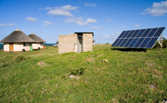Putting Africa On A Clean Power Path
 According to the United Nations, 1.4 billion people—one in five globally—don’t have access to modern electricity, and 3 billion people still rely on solid fuels like wood and coal for cooking and heating. But there might be hope for improving the situation by emphasizing clean energy sources appropriate for particular areas of the continent, according to the European Commission’s Joint Research Centre’s new study on the potential for renewable energy in Africa.
According to the United Nations, 1.4 billion people—one in five globally—don’t have access to modern electricity, and 3 billion people still rely on solid fuels like wood and coal for cooking and heating. But there might be hope for improving the situation by emphasizing clean energy sources appropriate for particular areas of the continent, according to the European Commission’s Joint Research Centre’s new study on the potential for renewable energy in Africa.At over 11 million square miles, Africa is far from uniform in geography, population density or development, making the task not so straight-forward. Researchers analyzed current energy consumption, cost efficiency, and environmental sustainability of solar, wind, biomass and hydropower in Africa.
So what does an efficient, renewable-energy focused Africa look like? Depends on where you’re looking. In Sub-Saharan Africa where most of the population lives in rural areas without electricity, firewood and charcoal comprise 80 percent of total energy use. To prevent the depleting wood resources, the report focuses on finding cleaner energy alternatives to traditional biomass use and suggesting a wood fuel sustainability index.
In Northern Africa, renewable energy sources have to compete with the low cost of cheap, often-subsidized fossil fuel. Solar presents a powerful energy supply, able to produce twice as much electricity in parts of Africa than the same panel in Central Europe. Larger installations would work well in areas with adequate infrastructure, but in rural areas there is an added cost for grid extensions and using traditional diesel generators.
Under the current grid structure, wind power could be used on a large scale in Northern Africa, along the Mediterranean coast, and in the southern most parts of Africa.
With the abundance of permanent rivers throughout Equatorial Africa, small hydroelectric power plants are well suited—especially as most households and villages are already closer to a river than to an existing electricity grid.
To best implement these ideas, the report concludes that this knowledge should be transferred to research and technology partners in Africa, asserting that “only if much of the research, prototyping, demonstration and large scale deployment are done by African people, one can accelerate the uptake of renewable energy in Africa.”
You can return to the main Market News page, or press the Back button on your browser.

